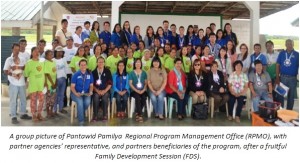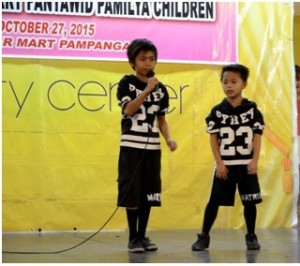RAC visits the province of Aurora, on its third year implementation of Pantawid
Aurora — To suss out the beneficiaries, their current status, and the impact of convergence strategy is the very objective of the Regional Advisory Committee (RAC) 3-day Consultation Meeting and Field Visit in the province last March 2-4, 2016.
RAC is composed of the region’s national legislators in the Philippines and selected members of the Regional Development Council (RDC), namely, Commission on Population (PopCom), Departments of Agriculture (DA), Budget and Management (DBM), Education (DepED), Interior and Local Government (DILG), Health (DOH), Labor and Employment (DOLE), Tourism (DOT), Trade and Industry (DTI), Public Works and Highways (DPWH), National Commission on Indigenous People (NCIP), National Nutrition Council (NNC), Philippine Health Corporation (Philhealth), Technical Empowerment and Skills Development Authority (TESDA), and Civil Society Organizations (CSOs) as partners of the Department of Social Welfare and Development (DSWD) in the implementation of Pantawid Pamilyang Pilipino Program.
Linkages Significance
“Noon, marami kaming nagagawa na hindi pala dapat, tulad ng pagbi-bingo at pag-inom ng alak, pate kaming mga nanay. Kaya naman salamat sa Panginoon at mayroong ganitong program sa barangay namin, kaya nabago kami. Salamat sa Panginoon at sa Pantawid (Before, we used to practice things that we are not supposed to do, like playing bingo and alcohol drinking, even us, mothers. That is why I am really thankful to God that there is a program like this in our barangay, for we have change. Thanks be to God and Pantawid),“ said Marissa Hermingildo, 43, during the Open Forum in a Family Development Session (FDS) held at Barangay Debucao, Ma. Aurora.
Having the presence of the National Government Agency (NGA) partners of the DSWD in the FDS, the beneficiaries took the opportunity as a venue to show their gratitude. Ailyn Lapada, 26, thanked Philhealth. “Wala kaming binayaran nang ma-confine ang anak ko sa Provincial Hospital dahil sa impeksyun sa bituka (We did not pay anything when my child was confined the Provincial Hospital because of an infection in the intestine),” she said. All Pantawid beneficiaries are entitled to receive of medical assistance from Philhealth. Likewise, Lilibeth Handok, 46, acknowledged TESDA for the skills training on Building and Wiring Installation given to her son, and DPWH for the Trabahong Lansangan project where her husband Artemio was one of the beneficiaries. Also, Castillo Inicencio, the Captain of Debucao extended his gratitude to DPWH for the covered court given to them, where the very event was held.
To raise awareness, Ptr. Rose Lomboy-Tabulismo asked on what would happen to the remaining poor in the barangay who are not yet included in the program, and those who are not supposed to be included in the program for they already well-off.
“Recently there had been a second round of assessment by the National Household Targeting System (NHTS) or Listahanan to saturate and include the remaining households since during the first round only the areas having a great poverty incidence are included. The system is the one who is going to determine who will be the additional or replaced member base on their answers in the tool that was use. On the other hand, through grievance system, the grantees who are not supposed to be members of Pantawid will be assessed,” answered
Tomasa Lirio, Regional Program Coordinator (RPC) of Pantawid. She then introduced the Grievance Officer of Aurora, and then gave them the grievance hotline number.
Aurora is one of the best provinces implementing Pantawid was the reflection revealed during the presentation of Ms. Josephine Dela Tonga, Provincial Link, in Machiavelli Hotel, where the committee moved afterwards. Aurora is now on its third year implementation of Pantawid. As shown in Ms. Dela Tonga’s presentation, there were multiple Municipal Links’ (MLs) initiative in the province that already serves as source of food and income of the beneficiaries, namely, May Bio-Intensive Garden Ako (May BIG Ako), Food Always in The Home (FAITH), Pantawid Pamilya Ikaw ang susi Nang ang Yaman at kaginhawahan Ay aming makamtan (PINYA), and Baby at Nanay Okay ka sa Kalusugan (BANOK).
May BIG Ako and FAITH are backyard gardening projects of Pantawid beneficiaries in order to promote daily nutritious food for the health of their family. While PINYA is a project by the Pantawid beneficiaries to earn money in preparation to their next project Botika ng 4ps sa Diaman; in this project, the beneficiaries were able to use their acquired skills and knowledge during the FDS facilitated by the Municipal Agricultural Office (MAO). On the other hand, BANOK, alongside with May BIG Ako, started due to identified malnourished children beneficiaries in Maria Aurora last January 2015; the Pantawid beneficiaries are to take care of Baboy or pig and Manok or chicken to serve as their source of nutritious food and income, as well.
There are also other programs and trainings in the province prioritizing the Pantawid beneficiaries that includes: Chips-Making, Cattle and Buffalo Dispersal, Mushroom Production, Banana Paper Livelihood, and Buccayo-Making, sponsored by the partner agencies. The beneficiaries, now, are making profit of the learnings and skills they gained.
Having appreciated the best practices of the province, the NGA partners suggested that associations established by the beneficiaries should be registered as micro-enterprises so that the following will be entitled of further assistance from government programs. ### (Andyleen C. Feje)



